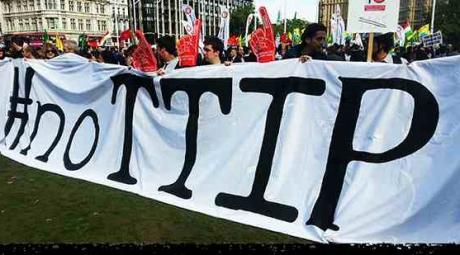By
This week sees the start of the ninth round of talks towards the infamous Transatlantic Trade and Investment Partnership (TTIP), the EU-US treaty that is widely seen as one of the greatest threats to democracy in the 21st century.
Negotiators from the European Commission and US government are meeting in New York to try to unblock a deal that is already becoming too toxic for politicians to handle. Luckily for them, the negotiations are always held behind closed doors.
Despite the secrecy, leaked documents have revealed that this week’s talks will centre on a trade-off between opening up European agricultural markets on the one hand (a key US demand) and access to US public procurement contracts on the other (one of the EU’s main targets). In the twisted logic of free market fundamentalism, EU negotiators plan to trade away the farming sector of Europe to the giants of US agribusiness in the hope that large European corporations might in return be granted access to local government contracts in the US states.
Neither of these are desirable outcomes. Farmers in several European countries are already raising the alarm at the prospect of European agriculture being wiped out by unfair competition from US agribusiness, which has to comply with none of the food safety or environmental standards that we prize in Europe. The European Commission protests that it would never sacrifice our standards on the altar of free market dogma, but has already begun to relax a number of food safety rules as sweeteners for the final deal.
On the US side, there is public opposition to the idea that local procurement contracts could be thrown open to big European corporations simply so that fat cats on this side of the Atlantic can line their pockets further. Many of these contracts are deliberately protected in favour of small-scale businesses and family firms so as to keep jobs in the local economy. Official estimates predict that hundreds of thousands of US workers will become unemployed as a direct result of the market opening that TTIP will bring, just as hundreds of thousands of Europeans are predicted to forfeit their jobs as a result of the deal’s market liberalisation here.
Small wonder, then, that Saturday’s global day of action against TTIP and other free trade agreements saw over 750 separate protests in town and cities throughout the world. Hundreds of thousands of people took to the streets to demonstrate public anger against TTIP’s dogged pursuit of corporate profit at any cost. Different country platforms prioritise different aspects of the TTIP deal – the threat to our public services, the prospect of increased fossil fuel consumption or the undermining of the EU’s environmental protection rules, to name just three. Yet all campaigners unite in their disgust at TTIP’s complete disregard for democratic integrity and the rule of law.
Faced with this resistance, the European Commission has put its head in the sand and tried to deny there is anything wrong. For those of us who have been involved in trade policy debates with them over the past 20 years, this is the standard reflex of the Commission every time it feels its credibility slipping away. Ultimately, it is an unelected body that has no accountability to the European people. Like unelected bodies the world over, it simply increases its propaganda output in place of addressing its failures.
I made this point to EU Trade Commissioner Cecilia Malmström when we met in her office during the previous round of negotiations in February. Malmström conceded that TTIP is becoming more and more unpopular as people find out what it will entail for them, but added icily that she is in no way dependent on the approval of the European people. Ultimately, Malmström only needs to respond to the business lobby that designed TTIP in the first place, and which continues to pull her strings.
This arrogance does not play so well with those individuals who do need to get themselves elected, and are trying hard to do so at the moment. In the UK, more and more Labour politicians are now turning against their party’s support for TTIP, in recognition that it is not helping their chances of success on 7 May. I took part in a hustings in the Brighton constituency of Kemptown last week in which the Labour candidate was adamant that she would defy the party whip and vote against TTIP if it ever makes it to the House of Commons. Other parliamentary candidates are taking the same stance, their nervousness being a measure of the movement’s strength.
The campaign against TTIP will continue irrespective of whichever party eventually forms a government in the UK. The groundswell of popular outrage at the deal is building month on month, and the European Commission has already acknowledged that it will never meet its original deadline of concluding negotiations by the end of this year. The writing is on the wall for TTIP. Smart politicians should be considering their exit strategies in preparation for its defeat.










